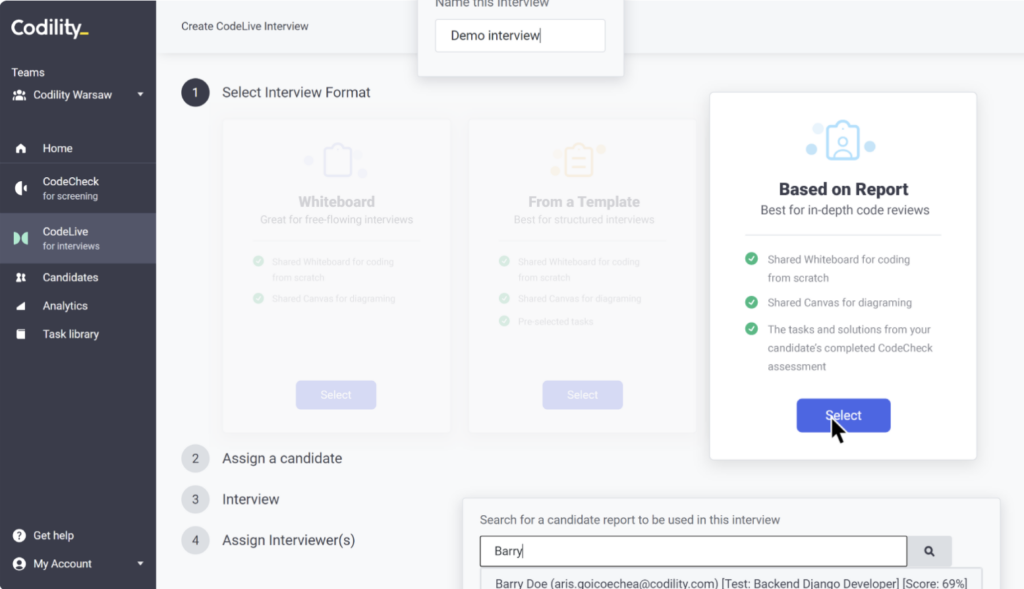Be the first to know
Sign up for a weekly dose of tech hiring news and updates.
Finding a good software engineer can be highly challenging for a tech recruiter. Statistics say that a bad hire can cost a company up to $240,000. Moreover, according to the US Department of Labor, a bad hire can cost a company up to 30% of an employee’s annual salary. So, hiring the right person is a critical task that can either save or cost your company a lot of money.
So what kind of questions do technical recruiters ask to find the right candidate the first time around? We’ve complied a list here for you that’ll help – and reduce your time-to-hire in the tech interview process.
1. Tell me about a project you completed successfully.
This question will help you understand how the candidate thinks and reasons. In your tech interview, ask them to describe the process and how they got to the positive outcome. Try to focus on their attitude throughout the process and find out their ability to cooperate with other team members.
2. What’s important when checking another team member’s code?
There’s no right or wrong answer to this question — it will give you insights into how the applicant approaches both coding and teamwork. It’s useful when interviewing software engineers to try and understand someone’s thought process surrounding coding and working with others, as both are essential for successful projects.
3. Have you disagreed with your team lead? How did you overcome it?
There will always be disagreements, no matter how much your team is thriving. That’s not to say they’re bad; diverse teams bring diverse viewpoints, and healthy debate over a product can lead to enlightening solutions.
Asking a candidate to tell you about an example from their past will showcase their communication skills and peace-keeping qualities.

4. What work environment keeps you motivated?
This software engineer recruiter question is where you find out whether the environment you’ve set in your company is suitable for this particular candidate. Finding a culture fit is more important than finding a software engineer with outstanding technical skills, and it’s important not to let a culture fit assessment become subject to personal bias.
Hire a person with the right attitude to thrive in your particular workplace. A good tech lead will easily be able to improve their project-specific skills and train them to succeed.
5. What project management tools do you prefer? Why?
The tools your candidate prefers to use can tell you a lot about their organizational skills, experience, and B2B SaaS knowledge. Although it’s not a necessity to find someone with total familiarity with your tech stack in your tech interview, it gives a better insight into what their onboarding needs to look like.
You might also like: Programming Problem-Solving Interview Questions You Should Ask
6. Can you talk about past mistakes you’ve learned from?
No software engineer has gone through life without making mistakes at some point — they’re only human. Ask them to explain the error and how they addressed it, and what they learned from the experience.
This doesn’t just mean in terms of software engineering — it’s an excellent opportunity to better understand how the applicant processes failure and keeps moving forward.
7. How do you stay up-to-date with the software engineering industry?
Software engineering is a fast-moving field, and software engineers must stay on top of emerging trends and technologies.
Ask your applicant how they engage with the industry and what steps they take to ensure they’re always on top of any new information. It’s a great way to gauge how engaged an individual is with the industry.

8. How did you learn to code, and what was the first thing you built?
As far as software engineer recruiter questions go, this one is great for finding out how the candidate learned to code. It will also tell you why they started coding in the first place.
How did they fall in love with coding? How excited were they about their first project? It’s crucial to hire someone who genuinely loves what they do, as their output will reflect their joy. Careful, though, this question can lead your tech interview down a few rabbit holes. Try to limit their answer to a time frame.
9. What do you think is the most exciting (recent) development in software engineering?
This question somewhat follows the previous one, but an applicant doesn’t need to be super plugged into the software engineering scene to answer. It’s a fun question that gives the applicant space to discuss their interest in software engineering without focusing on them.
This answer points to what areas of the industry the applicant is interested in and how their knowledge and interests can assist and complement the existing team.
More like this: Four Tips to Improve Your Developer Hiring Strategy – Fast
10. What project are you most proud of?
This question will point out how the candidate feels when contributing to a specific mission or goal. What was the mission they found the most relatable?
It will also show you the kinds of projects your candidate wants to work on, discovering whether they are the right fit for your company and the role you have in mind.
Once you finish the initial tech interview with these software engineer recruiter questions, you need to check the candidate’s technical capabilities. Try conducting a role-specific assessment with CodeCheck.
The test analyzes correctness and performance, allowing you to observe how the candidate’s code changes over time, which gives you insight into how they approach a technical challenge.
To learn more about how Codility’s software engineering hiring platform can help you conduct an effective tech interview, schedule a demo.
